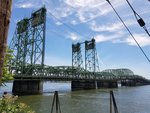

Members of a bi-state legislative committee tasked with steering the development of an Interstate 5 bridge replacement had their first meeting with a newly-selected project administrator, who stressed a focus on community involvement as key to seeing a successful project come to fruition.
Members of the Joint Oregon-Washington Legislative Action Committee met remotely July 16 for the first meeting of the group in 2020. Among an agenda including updates from both states’ departments of transportation and review of a number of planning components for future developments in the bridge replacement project, the Interstate Bridge Replacement Project Administrator Greg Johnson was introduced to the committee.
Johnson had officially started as project administrator July 6. Before his start, both directors of Oregon and Washington’s respective departments of transportation voiced their support behind Johnson’s hire in a June announcement, with Oregon Department of Transportation Director Kris Strickler saying Johnson was “the right person to take the helm” of the project.
“Greg’s skillset and experience providing strategic leadership and building partnerships to move projects forward will add immeasurably to our ability to deliver this program,” Washington State Department of Transportation Director Roger Millar said in the announcement.
The announcement noted Johnson had worked on major infrastructure projects in Maryland and Michigan, including work on the Gordie Howe International Bridge project, a bridge that will connect Michigan and Windsor, Ontario, Canada, that broke ground in 2018.
WSDOT Southwest Regional Administrator Carley Francis said that apart from a “depth of experience” with state departments of transportation, Johnson seemed to have “a very strong understanding of the human side of projects like this.”
“There is an engineering problem to solve here, but it is not likely the most challenging aspect of this program,” Francis said.
Acknowledging that in some aspects having embedded local knowledge could be an asset, Francis said hiring Johnson was the chance to “bring a fresh perspective” to the project, adding that there was staff with experience able to bring him up to speed.
Johnson said the bridge replacement was “a project of national, and even international significance,” noting how the interstate connected Mexico and Canada.
Johnson said he’s been calling the project a “modernization” of the infrastructure, saying he believed when completed it would be “one of the smartest bridges in the country,” with traffic assignments, accident response and solar infrastructure among its improvements.
Johnson recounted his experience on the Gordie Howe International Bridge project, infrastructure which had its need identified in the 1990s. The process involved a battle with a privately-owned bridge owner who had an existing U.S.-Canada crossing, he noted.
Johnson’s work on that project involved meetings between representatives from both sides of the Detroit River to “basically do the same thing we’re doing here” in establishing the needs of both communities for the new infrastructure.
Johnson acknowledged that any project will have some disruption for the local communities, though he stressed a focus on their inclusion through the process as part of a newer way of thinking about the work.
“(Departments of transportation) used to come into a community and say, ‘well, you guys step aside, and we know best, and we’ll get this done,” Johnson said. “Those days are long gone.”
Johnson said the process would involve taking communities’ input and reaching consensus of more controversial aspects such as bridge type and mass transit component.
“I think it’s ... an engagement issue in making sure that we are hearing and bringing consensus between the public on both sides of the bridge to create one vision of what this bridge will be for both communities,” Johnson said.
“It’s not just listening for lip service,” Johnson said later, spurred on by comments from committee member and Oregon State Sen. Lew Frederick, D-Portland, who expressed concerns for his constituents being represented in discussions.
Outside of community engagement, Johnson said three things were at the forefront for any project manage — cost, scope and schedule.
“If you can do those three things right, you generally will end up with a successful project. If one of those go awry, you get off track,” Johnson remarked.
Johnson did acknowledge the importance of the aesthetic component of a replacement bridge, saying the project should be something “iconic” while not being “frilly.”
“You don’t want to … invest this much money and build something that doesn’t inspire the passion of people when they use this infrastructure,” Johnson said.
Southwest Washington legislators on the committee gave Johnson a warm welcome at the meeting, expressing interest to meet with the project director on a walk around Vancouver to get a lay of the land.
“I’d welcome you to do a walk along the Columbia River, take a look at some beautiful things, and look at that bridge,” Washington State Rep. Paul Harris, R-Vancouver, remarked.
The committee will meet again in August, either Aug. 6 or 17, though an exact date was not set as of the meeting’s conclusion.